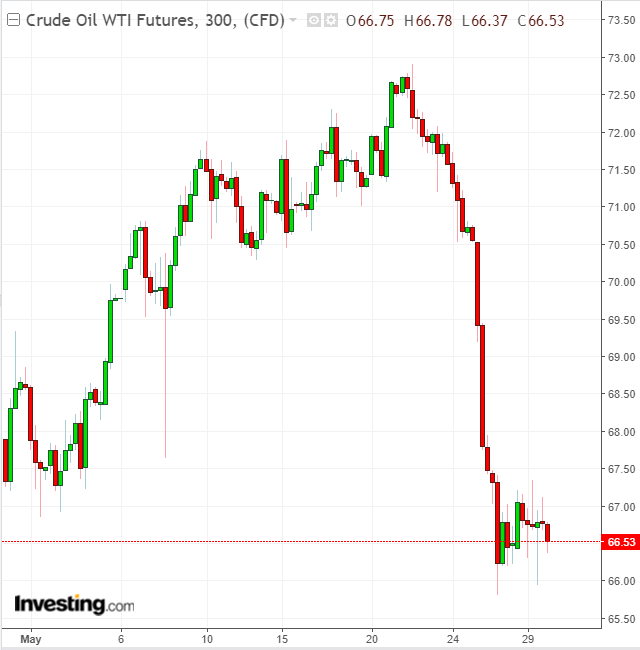Oil prices fell last week and have continued to fall this week after Saudi Arabia and Russia announced that OPEC and its non-OPEC partners (together termed OPEC+ hereon out) would consider increasing production. The oil ministers of the UAE, Kuwait and Saudi Arabia plan on discussing options in Kuwait this weekend.

Some attribute these actions to pressure from U.S. President Donald Trump, who tweeted in April that OPEC was to blame for higher oil and gasoline prices. Last week Democrats in the U.S. Senate tried to blame President Trump for higher oil prices, saying he did not take a hard enough stance towards OPEC.
Two days later, Russia and Saudi Arabia announced that, after private talks on the sidelines of the St. Petersburg International Economic Forum, they would consider raising oil production by a yet to be determined amount at the regularly scheduled June OPEC meeting. Oil futures immediately began to fall and prices fell through the rest of Friday trading.
At the main meeting in St. Petersburg, OPEC Secretary General Mohammad Barkindo gave a nod to President Trump, saying that, “We pride ourselves as friends of the United States,” and went on to recall that in the past the United States has called on OPEC to increase oil production in order to lower prices. What Barkindo did not say was OPEC+ would act to increase production as a result of statements from U.S. government officials. In fact, U.S. officials were not even the first to complain to OPEC about rising oil prices. India was one of the first nations to call Saudi Arabia with concerns about rapidly rising oil prices in May.
Instead of assuming that OPEC+ is bowing to pressure from the United States and other consuming nations, market watchers should ask, “What underlying motivations do OPEC+ countries have to support an increase in oil production?” Unless these oil producing countries fear military or economic retribution from the U.S. or some other economic consequence, politically motivated statements from U.S. politicians delivered over Twitter or by grandstanding outside of a Capitol Hill gasoline station are immaterial to the producing countries. The oil producing countries are motivated, first and foremost, by their own interests—revenue, the health of their own oil industries and their own domestic political situation.
As a group, OPEC+ also has the added motivation of group solidarity. By keeping the group together, its leaders (Saudi Arabia and Russia) gain power. Therefore, the most important reason OPEC+ has for seeking a mild increase in production is to maintain the integrity of the original production cut agreement and the institution that has grown around its implementation and maintenance.
Since May 2017, certain countries have been angling to either get out of the agreement or for special permission to produce more oil. These countries have included Kazakhstan, Iraq, Ecuador and Russia. Saudi Arabia and other OPEC heavyweights want to keep the OPEC+ group together—the UAE has pushed especially hard to institutionalize it—because with more barrels of oil the group has a greater chance of impacting the market. Ensuring that Russia, Kazakhstan and Mexico stay involved is especially key.
OPEC+ has technically cut more barrels of oil than the original deal intended and the group is facing the possibility that even more oil will come off the market as U.S. sanctions on Iran return and Venezuela continues to decline. With this in mind, OPEC+ can keep the deal intact and also permit certain producers with spare capacity to increase production. Oil prices would decline slightly, but not nearly to the levels seen during the height of the production spree in 2015 and 2016.
U.S. politicians whining about a 20-cent increase in the price of gasoline before the Memorial Day holiday hardly registers on their list of concerns. On the other hand, it behooves Barkindo to reference the United States in his remarks, not because it is a true calculation in OPEC decision-making, but because the statement promotes good relations with the United States.
Politicians in the U.S. may spin this as a win on their own political scorecards, but it actually makes Barkindo and OPEC look powerful because despite all of the oil production in the U.S., politicians still see it as necessary to come to OPEC and ask the cartel to lower oil prices.
Each of the actors here is playing their own game—both with each other and with the media. Market-watchers, however, need to see through this rhetoric in order to make intelligent decisions about where they think the oil market is truly heading in the future.
